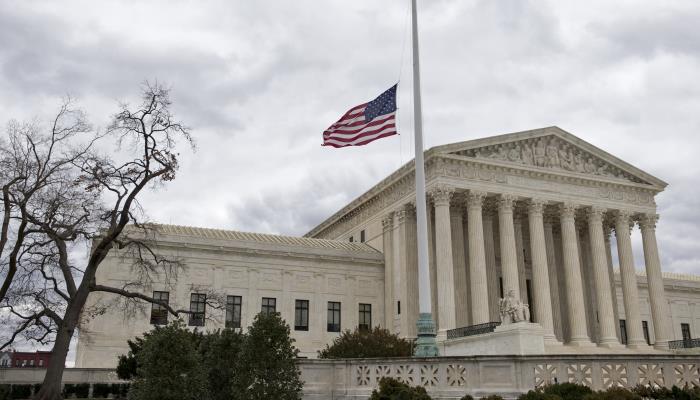
States can’t use the federal courts to try to force the federal government to arrest and deport more people who are in the country illegally, the Supreme Court ruled Friday.
The 8-1 decision could cut down on a flood of lawsuits recent administrations have faced from state attorneys general and governors who disagree with Washington on immigration and crime policy.
The high court’s ruling found that Texas and Louisiana lacked standing to pursue litigation challenging immigration enforcement priorities established by President Joe Biden’s administration soon after he took office.
It’s the second decision in eight days in which the Supreme Court has rejected lawsuits from Texas on standing grounds. Last week, the court ruled that the state did not have standing to challenge a federal law that gives preferences to Native American families in the adoptions of Native children.
State standing is a key question in another major issue still awaiting decision from the court in the coming days: the legality of Biden’s decision to wipe out billions of dollars in student debt.
Six states are challenging the debt-relief plan, but it’s not clear if the states have suffered the sort of concrete harm that is typically necessary to challenge a policy in court. (In a separate case, two student-loan borrowers who oppose the plan are also suing. Their legal standing is also contested.)
In the immigration case, critics of the states’ approach said their claim of likely financial injury from unwarranted release of undocumented migrants was murky. But the court’s majority opinion written, by Justice Brett Kavanaugh, took a different tack and said the case was flawed because of a general principle against suits trying to force the executive branch to enforce the law against someone else.
“This Court has consistently recognized that federal courts are generally not the proper forum for resolving claims that the Executive Branch should make more arrests or bring more prosecutions,” Kavanaugh wrote, in an opinion joined by Chief Justice John Roberts and the court’s three liberals. “If the Court green-lighted this suit, we could anticipate complaints in future years about alleged Executive Branch under-enforcement of any similarly worded laws — whether they be drug laws, gun laws, obstruction of justice laws, or the like. We decline to start the Federal Judiciary down that uncharted path.”
The states challenged a Biden policy that directed immigration authorities to focus their enforcement efforts on people deemed to pose threats to public safety. Biden’s priorities differ from those of his predecessors, but Kavanaugh noted that, in the 27 years since the relevant immigration-law provisions were passed, the executive branch has never done what Texas and Louisiana sought in this case: the arrest and deportation of all foreigners covered by the language of the provisions.
“All five presidential administrations have determined that resource constraints necessitated prioritizations in making immigration arrests,” noted Kavanaugh, an appointee of President Donald Trump who also worked in the George W. Bush White House early in his career.
Kavanaugh described the decision in the case as “narrow,” and said it would not automatically apply to federal government policies outside the area of arrest and prosecution, where the executive branch has traditionally been granted broad discretion.
Justices Neil Gorsuch, Clarence Thomas and Amy Coney Barrett agreed that the states lacked standing, but for a different reason. They said Congress specifically barred courts from issuing injunctions related to certain immigration laws.
“The Constitution affords federal courts considerable power, but it does not establish ‘government by lawsuit,’” Gorsuch wrote in an opinion joined by the two other conservatives.
Justice Samuel Alito was the lone dissenter, arguing that the court’s “deeply and dangerously flawed” ruling unwisely gives the executive branch unbridled power. “And it renders States already laboring under the effects of massive illegal immigration even more helpless,” the conservative justice added.
----------------------------------------
By: Josh Gerstein
Title: Supreme Court: States can’t sue over Biden’s immigration policies
Sourced From: www.politico.com/news/2023/06/23/supreme-court-states-cant-sue-over-bidens-immigration-policies-00103417
Published Date: Fri, 23 Jun 2023 11:56:50 EST






